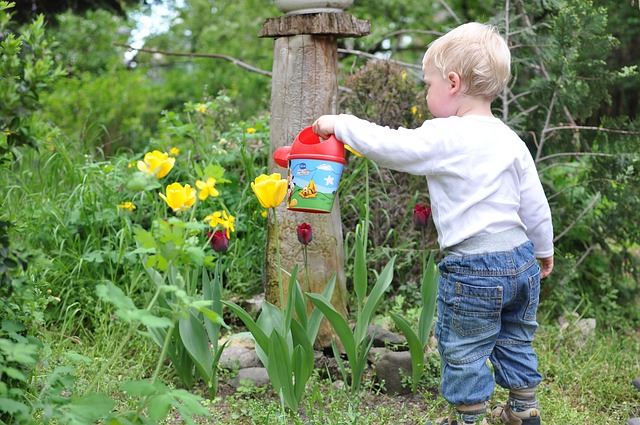
“The glory of gardening: hands in the dirt, head in the sun, heart with nature. To nurture a garden is to feed not just on the body, but the soul.” – Alfred Austin
Children and gardening seem to go hand in hand. Tiny minds longing to explore, hands that love to dig, and the young desire to be a helper are all at play when we bring our children into the garden.
As a parent, allowing children to garden alongside can seem overwhelming. It is easy to wonder how to balance just how to keep children safe while also allowing them to feel as though they are truly contributing to the family garden. Here are a few ways to garden with your children and spark in them a true joy in the growing world.
Give Them Autonomy
If you have the space, Nourishing Pursuits suggests giving children their own small garden, where it matters less if small feet accidentally trample a seedling or a tomato is plucked before it is time. Like Mary Lennox in The Secret Garden, a small place of their own gives a child a sense of ownership, and a desire to see their hard work come to fruition. Give them guidance, remind them of the needs of the plants, but try to allow them space to do it for themselves. Often the natural consequences of good care (or not-so-good care) are better teachers than parents could be on their own.
Get the Right Tools
Children love to get their hands on equipment. Don’t be scared to let your child handle tools. Even a small child can handle a spade or small rake.
If your child is older than preschool age, you may find that you are able to teach them to use larger tools. A preteen can be taught to use a string trimmer (Make sure you choose the right one. There is a good guide here, with many options to choose from.) An older teen, can use almost anything an adult can use. Let your kids get their hands on the working parts of gardening.
Make it Practical
If you have a child who doesn’t necessarily appreciate the innate but impractical beauty of flowers, perhaps guide them in a vegetable garden. If they are pasta lovers, help them plant tomato and basil to make sauce. Pie lovers might do better with pumpkins and sweet potatoes. Whatever your child chooses to grow, seeing the literal fruits of their labor on the dinner table will give them a sense of accomplishment and a better understanding of the food they eat. There are healthy foods we should all be adding to our diets, and children who spend time growing their own food are more likely to make healthy food choices.
Head off Problems Early
Before you begin your yearly garden, try to look at the area through the eyes of your child. What complications could you see yourself running into? Nourish Pursuits suggests establishing pathways before doing any planting. It is easier to train a child not to trample budding plants than it is to correct them later. The same goes for teaching them to handle plants, and the virtue of patience as they wait for plants to mature enough to harvest. Keep in mind that problems in the garden are a good bit like weeds. If you head them off early, you won’t have a problem, but allow them to take root, and you may rob your garden of its joy.
Allow Yourself to Breathe
Adults often miss the mark when it comes to childhood experiences. We get caught up in how things are “supposed” to be, and sometimes invite unnecessary stress. Don’t feel like you need to make your child’s garden perfect or immediately correct each mistake. Breathe. Allow them to discover freely. Will Allen, director of Growing Power, a nationally recognized nonprofit organization that promotes urban agriculture, reminds us that “It’s…a healthy, therapeutic thing to teach about the living soil. Kids can be wired, and they calm down when they work in the soil. To eat something you produce is a worthwhile and meaningful thing.” (Rordale’s Organic Life)
Gardening feeds the soul, and to share that beauty with children is a noble thing, especially in a day and age that seems to rush by, with little heed for growing things. As Valerie Andrews said, “As a child, one has that magical capacity to move among the many eras of the earth; to see the land as an animal does; to experience the sky from the perspective of a flower or a bee; to feel the earth quiver and breathe beneath us; to know a hundred different smells of mud and listen unselfconsciously to the soughing of the trees.”
